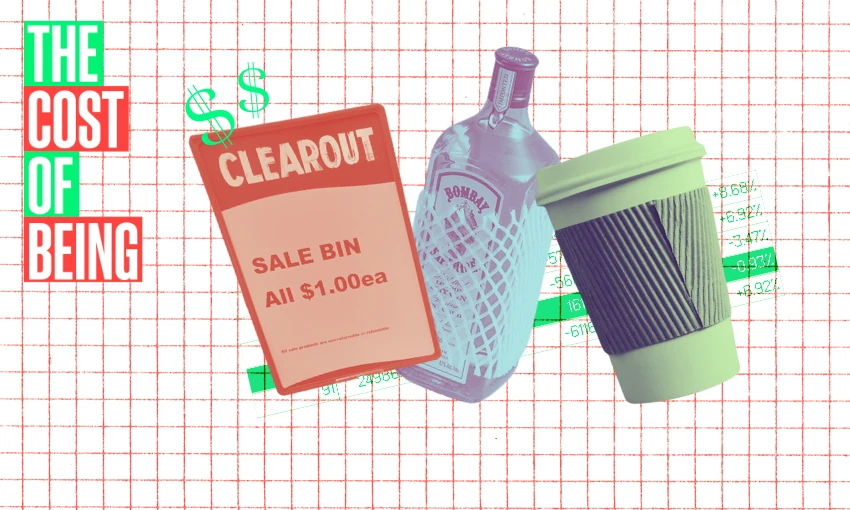Copyright thespinoff

As part of our series exploring how New Zealanders live and our relationship with money, an office worker explains their approach to spending – and saving. Want to be part of The Cost of Being? Fill out the questionnaire here. Gender: Female. Ethnicity: Pākehā. Role: Full-time office worker. Salary/income/assets: Salary $103,000. Rental income $1,200 a week. Assets around $800,000. My living location is: Suburban. Rent/mortgage per week: Rent is $495 weekly split between my partner and I. Mortgage on investment properties is around $1500 a week. Student loan or other debt payments per week: $150 a week for loan from family. No other debt other than mortgages. Typical weekly food costs Groceries: My partner and I both put in $75 a week and that covers the groceries, including cleaning supplies etc. I check out the reduced-to-clear and $1 bin at the supermarket and vege shop almost daily. Eating out: A scone or a meal out probably every two weeks so maybe $70 a month. Takeaways: Rarely. Fish and chips a few times a year. Workday lunches: Once or twice a year. Cafe coffees/snacks: I prepay for coffees from the local, which brings it down to $4.10 (four days a week) plus a few weekends ones. So around $25 a week. Other food costs: I have an allotment patch and also a garden at home. I’m trying to grow more from seed this year. Probably $300-400 on compost, seeds and seedlings a year. We go to the bulk bins shop every few months and reduced to clear but that’s covered in our usual grocery budget. Savings: Through side hustles (cleaning once a week, extras work, work during the election, online surveys) I save around $6000 a year which I keep in an account for travelling only. I worry about money: Sometimes. Three words to describe my financial situation: Focused, fortunate, concerned. My biggest edible indulgence would be: We’ve cut back on purchases of some food like fruit, cheese, fish… but will always buy good coffee beans. In a typical week my alcohol expenditure would be: In an average month it would be a few glasses of wine out and one bottle of under $10 wine at home. We have quite a few bottles of gin and whisky at home bought cheaply overseas. In a typical week my transport expenditure would be: I walk the hour to and from work each day so no commuting costs. Maybe $10 on petrol (we only recently got a car) and $10 on my Snapper card. I estimate in the past year the ballpark amount I spent on my personal clothing (including sleepwear and underwear) was: 95% is secondhand – for both environmental and fiscal reasons. Around $500. My most expensive clothing in the past year was: A secondhand designer dress for $50. My last pair of shoes cost: Secondhand salt water sandals for $6. My grooming/beauty expenditure in a year is about: Threading for $30 every 6-8 weeks. A $55 haircut twice a year. No other beauty treatments. I bulk bought all my skincare and sunblock in Japan recently for $200 but that should last two years. Around $200 a year on makeup (expensive concealer and bargain bin everything else). My exercise expenditure in a year is about: My only exercise is walking to and from work. $100 running shoes every couple of years. My last Friday night cost: Nothing – it was our staff Xmas party and then I walked home and had leftovers. Most regrettable purchase in the last 12 months was: A Temu “smart ring” for $35 (it constantly disconnects). Most indulgent purchase (that I don’t regret) in the last 12 months was: I’ve been on two three week overseas trips. The first one to Europe was still under $4,000 and I couldn’t miss the chance to go with family. The second to Japan was fully paid for with side hustles. One area where I’m a bit of a tightwad is: Almost everything but particularly food. I can’t get my head around spending $20 on a workday lunch that you have no time to enjoy or $50 on cold Uber Eats. Five words to describe my financial personality would be: Bargain-hunting; canny; minimalist; future focused. I grew up in a house where money was: Not spoken about often but I was aware that it was a concern. We never went without what we needed but I knew that was because my parents were good with their money. The last time my Eftpos card was declined was: Last month – despite checking my account multiple times a day. In five years, in financial terms, I see myself: I bought my first home at 22 and an investment property at 30 because I’m so focused on having an easier life by the time I retire. I know how incredibly lucky I was to be able to do this but it’s not without sacrifice. I lived in a mouldy sleepout while I had flatmates for the first few years and have rented the house out since because it doesn’t make financial sense to live there right now. In five years I hope to no longer be renting and being able to live mortgage-free in my home and without the pressure of the huge mortgages I have now. I would love to have more money for: Always travel. But eventually to semi-retire early. Describe your financial low: Probably now. I earn a great income and on paper I’m in a great position. But with mortgage rates and the cost of living, what I actually have in my pocket isn’t much. But I know this is short-term. I give money away to: I always have at least one volunteering position on – at the moment it’s being on my allotment committee and cooking for Bellyful. This makes me feel better about not donating a lot. But I pay a Patreon fee of $6 a month to a writer and donate to street appeals for the Women’s Refuge and Daffodil Day.



